Long ago, when the world was young, all people were happy, The Great Spirit, whose home is in the sun, gave them all they needed. No one was Hungry, no one
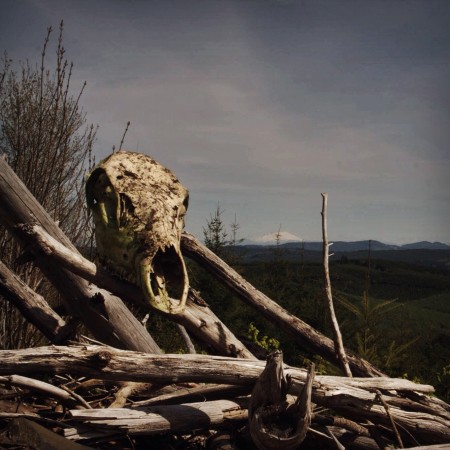
‘Keeper of Fire’ | © 2015 H a v e n
The Great Spirit took the two brothers to the top of the high mountains and wakened them. They saw that the new country was rich and beautiful.
“Each of you will shoot a arrow in opposite directions,” he said to them. “Then you will follow your arrow. Where your arrow falls, that will be your country. There you will become a great chief. The river will separate your lands.”
One brother shot his arrow south into the valley of the Willamette River. He became the father and the high chief of the Multnomah people. The other brother shot his arrow north into the Klickitat country. He became the father and high chief of the Klickitat people.
Then the Great Spirit built a bridge over the big river. To each brother he said, “I have built a bridge over the river, so that you and your people may visit those on the other side. It will be a sign of peace between you. As long as you and your people are good and are friendly with each other, this bridge of the Tahmahnawis will remain.
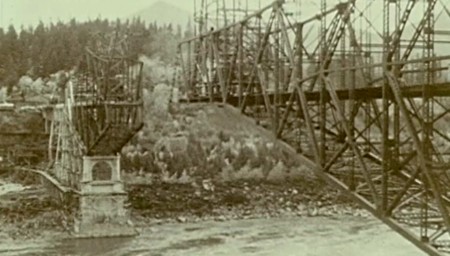
Building of the the modern day Bridge of the Gods, ca. 1925
Then they began to be sorry for what they had done, and they begged the Great Spirit for fire. “Give us fire, or we will die from the cold,” they prayed. The heart of the Great Spirit was softened by their prayer. He went to an old woman who had kept herself from the wrongdoing of her people and so still had some fire in their lodge.
“If you will share your fire, I will Grant you anything you wish,” the Great Spirit promised her. “What do you want most?”
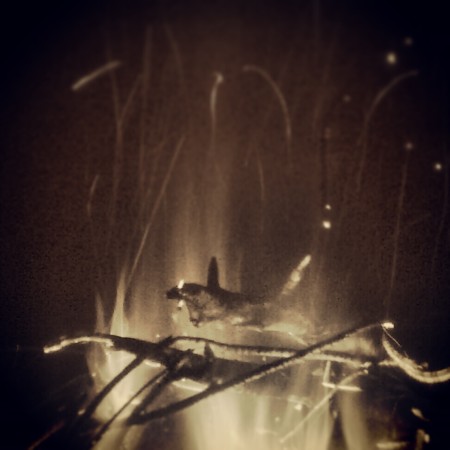
“Eternal” | ©2015 H a v e n
“You shall be young and beautiful tomorrow morning,” promised the Great Spirit. “Take your fire to the bridge, so that the people on both sides of the river can get it easily. Keep it burning there always as a reminder of the goodness and kindness of the Great Spirit.”
The old woman, whose name was Loo-wit, did as he said. Then the Great Spirit commanded the sun to shine again. When it rose the next morning, it was surprised to see a young and beautiful maiden sitting beside a fire on the Bridge of the Gods. The people, too, saw the fire, and soon their lodges were warm again. For many moons all was peaceful on both sides of the great river and the bridge.
The young men also saw the fire–and the beautiful young woman who attended it. They visited her often. Loo-wit’s heart was stirred by two of them–a handsome young chief from south of the river, whose name was Wyeast, and a handsome young chief from north of the river, whose name was Klickitat. She could not decide which of the two she liked better.
Wyeast and Klickitat grew jealous of each other and soon began to quarrel. They became so angry that they fought. Their people also took up the quarrel, so that there was much fighting on both sides of the river. Many warriors were killed.
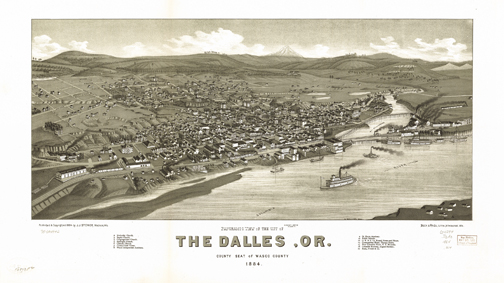
The Dalles, Oregon. ca. 1884
and blocked it. That is why the Columbia is very narrow and the water very swift at the Dalles.
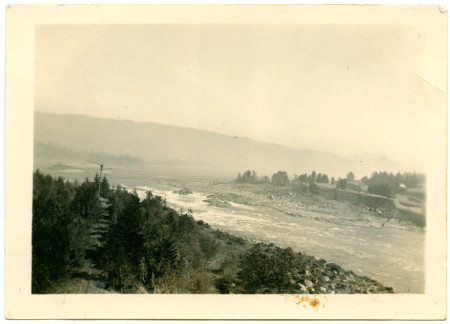
Pre-dammed Cascades. 1912(?) author unknown.
——-Clark,Ella (1953) Indians of the Pacific Northwest (renewed 1981). The Regents of the University of California
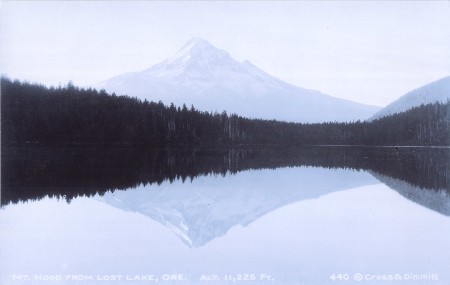 They knew the body of water as ‘Big Lake,’ and reached it by following Lake Branch of the Hood River to its source. Arriving at the lake during a typical Lost Lake rainstorm they proceeded to build lean-to shelters by stripping cedar bark from the great trees. On their third night at the lake, while lingering over an evening meal of trout, one of the Diver’s boys said: I wonder if that stuff on those trees would burn?’ and without thinking touched a long strand of dry moss with a red-hot stick he had just used to light his pipe. The moss burst into flame and quickly spread to other trees. They left without stopping to gather their camping gear. Wind swept the fire south and up what was later to become known as Huckleberry Mountain. The purple berries appeared in great number a few years after the fire.
They knew the body of water as ‘Big Lake,’ and reached it by following Lake Branch of the Hood River to its source. Arriving at the lake during a typical Lost Lake rainstorm they proceeded to build lean-to shelters by stripping cedar bark from the great trees. On their third night at the lake, while lingering over an evening meal of trout, one of the Diver’s boys said: I wonder if that stuff on those trees would burn?’ and without thinking touched a long strand of dry moss with a red-hot stick he had just used to light his pipe. The moss burst into flame and quickly spread to other trees. They left without stopping to gather their camping gear. Wind swept the fire south and up what was later to become known as Huckleberry Mountain. The purple berries appeared in great number a few years after the fire.